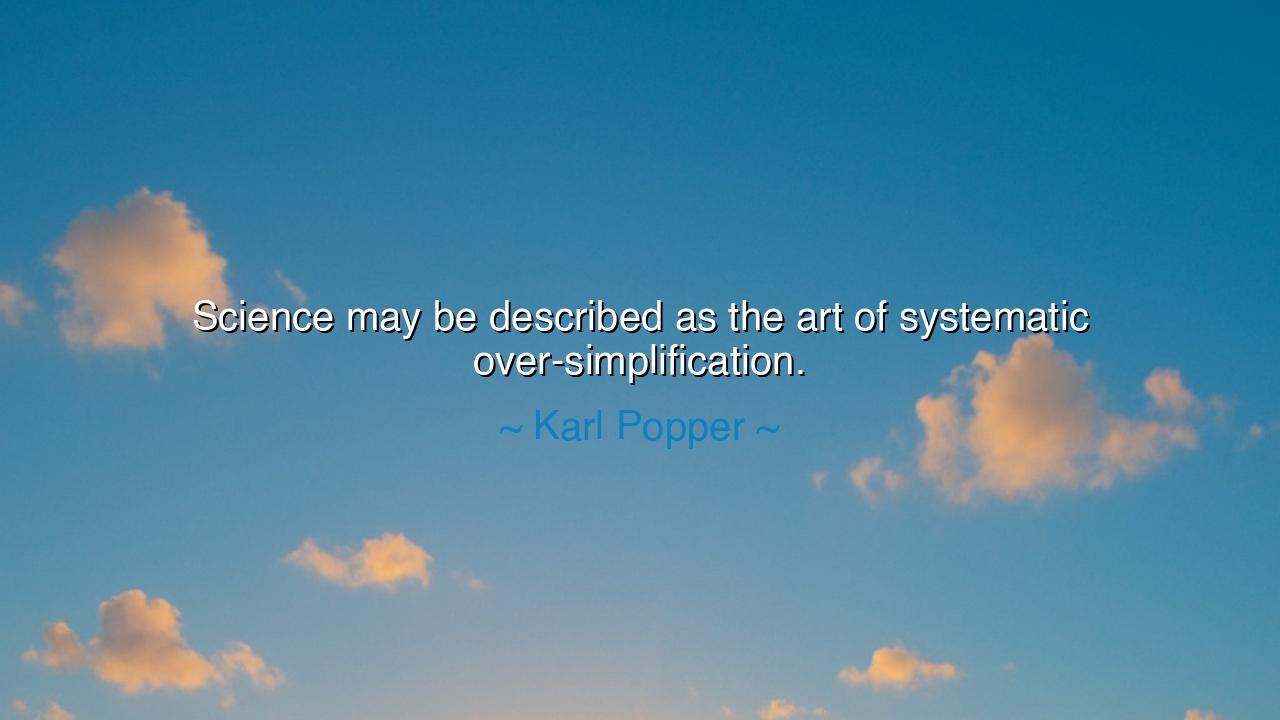
Science may be described as the art of systematic






Host: The room was quiet, a gentle hum of the outside world barely audible. Jack sat at the table, his gaze fixed on something he was reading on his phone, deep in thought. Jeeny, sitting across from him, noticed his pensive expression and set her cup of tea down, sensing something significant had caught his attention.
Jeeny: (gently) “You seem lost in thought. What’s going on?”
Jack: (looking up slowly, a thoughtful expression on his face) “I was just reflecting on a quote from Karl Popper. He said, ‘Science may be described as the art of systematic over-simplification.’ It really made me think about how science, as much as it seeks to explain the complexity of the world, often relies on simplifying things to make them understandable. It’s not that it ignores the complexities, but it distills them into models or theories that make sense within a framework.”
Host: Jeeny smiles softly, clearly intrigued by the depth of Popper’s words. She leans forward slightly, her fingers curling around her cup as she considers the meaning behind the quote.
Jeeny: “That’s such an interesting take, isn’t it? Science is often about reducing complexity — simplifying the vastness of the universe into something we can observe, measure, and test. But by simplifying, we’re also able to understand the bigger picture. It’s almost like science is the tool we use to cut through the noise and focus on the essential, the parts we can control or predict.”
Jack: (nodding) “Exactly. It’s not about ignoring the full complexity, but about finding patterns or structures that make the chaos of the world more accessible. In a way, the art of science is knowing what to leave out or how to abstract certain aspects in order to focus on what truly matters for understanding. By simplifying, it gives us the ability to create models or theories that help us navigate a complex reality.”
Host: Jeeny’s gaze softens, and she takes a deep breath, clearly reflecting on the nature of science and its role in shaping our understanding. The room feels more intimate now, as they both think about how science interacts with the world.
Jeeny: “Maybe that’s the beauty of science — it allows us to take complex phenomena and break them down into manageable pieces. But at the same time, it doesn’t claim to explain everything. There’s always a degree of abstraction involved, and what we’re left with are models that give us a working understanding, but not necessarily the whole picture. It’s about recognizing the limits of our understanding while still finding ways to make sense of the world.”
Jack: “Exactly. It’s a balance between simplifying enough to make sense of things, but also acknowledging that there’s always more beneath the surface. Science doesn’t have all the answers — it just provides us with frameworks that we can continue to build on, explore, and refine.”
Host: Jeeny smiles softly, her fingers lightly tracing the rim of her cup. The conversation feels like it’s opened up a deeper understanding of how science works as both a tool and a process — always evolving and simplifying to explain complex phenomena.
Jeeny: “It’s almost like science is a starting point for deeper exploration. Every simplification opens the door for more questions, for more complexity to be explored. The simplification isn’t the end, it’s just the way we begin to peel back the layers.”
Jack: (grinning) “Exactly. Science starts with simplification, but then the beauty of it is that it leads us to even greater complexities. It’s the foundation that allows us to keep questioning and learning.”
Host: The conversation settles into a peaceful silence, the understanding that science is not about reducing the world to easy answers, but about simplifying in order to understand it more deeply. Karl Popper’s words serve as a reminder that science is an ongoing process — one that seeks to break down complexity in a way that opens up new possibilities for exploration and understanding.






AAdministratorAdministrator
Welcome, honored guests. Please leave a comment, we will respond soon